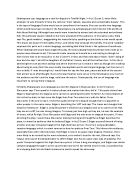Shakespeare uses language as a tool for disguise in Twelfth Night. In Act 1 Scene 5, when Viola attempts to woo Olivia for Orsino she calls her ‘most radiant, exquisite and unmatchable beauty’. This is the type of language Orsino would use to compliment her beauty. She uses courtly love language which would have been mocked in the Renaissance era as Shakespeare did in Sonnet 130 and Much Ado About Nothing. Although these works were intended to attract both the educated and ordinary folk, this particular aspect related to the more educated of the audience. In this same scene, Viola says ‘No, good swabber’, exaggerating her masculinity by speaking as she thinks a man would speak. This shows she doesn’t think highly of men, and thinks they all speak this harshly. The word ‘swabber’ emphasis this point as it is sailor language, something that Viola thinks is the epitome of manliness. When Shakespeare would have staged this play, the actor playing Viola would have been male as no women were allowed to act. This would create comedy as it would be a man acting as though he didn’t know how to be masculine. In Act 2 Scene 4, Orsino and Viola talk about Viola’s ‘sister’ dying of love and she says ‘I am all the daughters of my father’s house, and all the brothers too’. In this she is admitting the truth and then adding ‘and all the brothers too’ to make is seem as though she is talking about being an only child. She uses mostly monosyllabic words and simple language, but then turns it into a riddle. If I was directing this, I would have her say the first part, pause and add on the second half, almost as an afterthought. Due to the way theatres were set up in the Renaissance era, much of the audience couldn’t see the stage, only hear the actors. Consequently, the use of language was important to convey Viola’s disguise.








